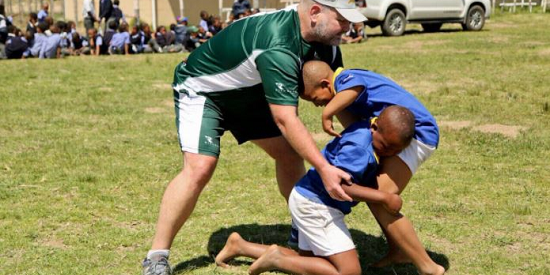Transformation in South African rugby must begin right at the grassroots. But as helpful as development coaching may prove to be, it’s equally important to give young newcomers the opportunity to see the game on free to air TV.
Teaching kids who have never played to tackle … And with no DStv, they never see the game on tv! What a wonderful experience … pic.twitter.com/PpxM4bZri1
— Tank Lanning (@TankLanning) October 14, 2017
It’s not particularly pretty on the South African rugby front at the moment, and as such it’s not particularly pretty being a rugby scribe in SA.
While it might drive website traffic and banter on social media, constantly finding fault with the game and its current structures can be demoralising.
One also takes stick from the “Glass half full” brigade who believe it their job to wear the short skirt and don the pom poms no matter what is transpiring in front of our eyes.
I think it’s the media’s job to ask searching and difficult questions – not for the sake of it, and not just to rustle feathers – but with a view to keeping people honest and making sure things are done for the good of the sport.
And perhaps that is one area where we have gone wrong in South Africa. SuperSport’s money, via the purchasing of rugby’s TV rights, has without doubt floated the professional game in South Africa. But in teaming up with SA Rugby to form a partnership, it lost the public questioning of the sport by the country’s biggest media player in the sporting space.
The deal also precludes the SABC from broadcasting any form of live rugby. Both topics for another day, but in one of the more rewarding days of my time in rugby, the impact of not having the game on free to air TV became immediately apparent.
It was an honour and a privilege to be asked by ex Bok wing Stefan Terblanche to join him and the SA Legends, a group of former players who do a massive amount of good work with less privileged kids via their VUKA programme, to spend the morning putting on a coaching clinic at Wysersdrift Primary in Worcester.
Facilitated by TV show host Dan Nicholl, who gave away a coaching clinic on his show, a group of us, including former Boks Dale Santon and Kabamba Floors, set about teaching these 11-year-olds the real basics of rugby. The school is offering rugby as a sport for the first time this year.
Teaching kids who have never played the game before, yet were fired up with excitement, to pass, side step, tackle and look after the breakdown, was a joy. I tried hard to get them on a scrum machine, but Stefan was having none of it – in front of the entire school who had come out to watch!
Talk about a life changing moment – for me. And I can only hope that we provided the odd change moment for a child or two.
“So who’s your favourite Super Rugby player?” I asked one of the little guys in my best Afrikaans, which I deemed horribly inadequate given the blank stare that I got in return. But then a teacher who had overheard the question told me that these guys don’t know the Super Rugby players because they do not see them on TV.
Another light bulb moment! How unbelievably sad. So we want to drive transformation numbers in our professional teams, yet we are denying the very people we want to take up the sport in order to achieve that goal, the ability to watch said teams on TV?
There is no simple solution, but on a day that warmed the cockles of my heart, I walked away knowing that in order to truly change things in rugby, transformation is going to need to be driven from the bottom up, and that rugby, in some shape of form, must be made available on a platform freely available to all.

Leave a Reply